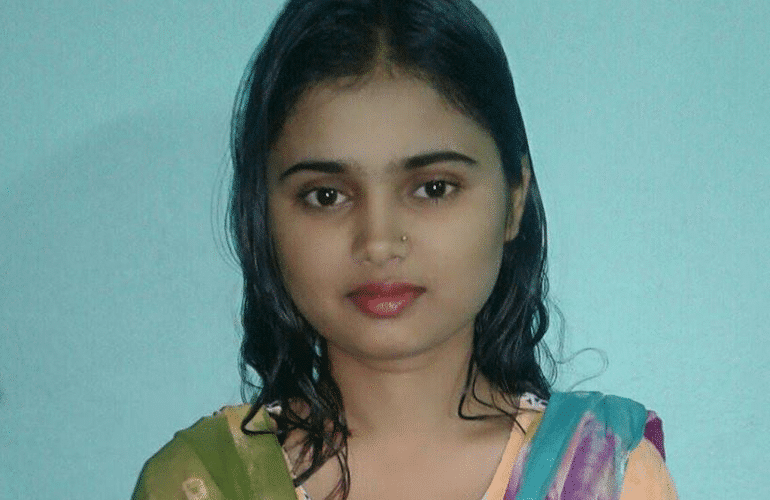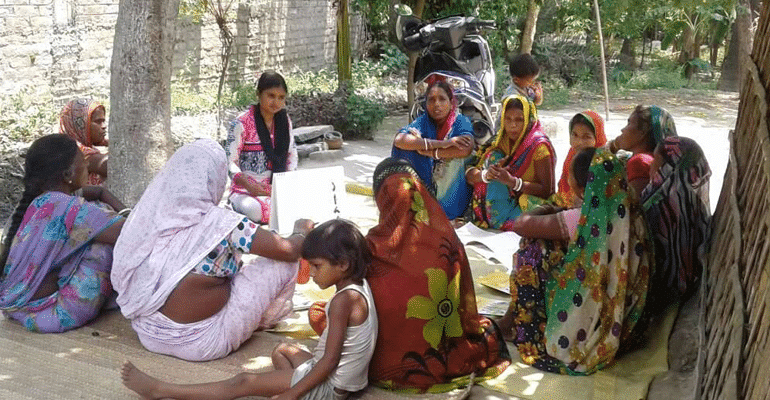Did it ever occur to you why celebrating Menarche(the first occurrence of menstruation) is so important in India? It seems the way you think about your period has a lot of impact on how you feel during the period. It is awkward for most adolescent girls in India when they have their periods. Why? Because forget about asking questions in school or home, the social conditioning is such that it drives one to a shell that is coated with embarrassment, mystery, and myths.
In order to handle issues related to menstruation, one needs to talk about menstruation and therefore Life Beyond Numbers got in touch with Chanda Thakur who is fighting to end the stigma around menstruation. She is also working with girls to educate them about menstrual hygiene in the rural areas of Bihar. “The problem is it is difficult to convince these girls and their parents that there is nothing to hide when a girl is menstruating,” she says.

A resident of Bihar’s Derai village, Chanda is pursuing her graduation in Sociology from BPS Vaishali College. The 21-year-old has a much deeper understanding of the problem because, like most of the girls, she was also a victim of period shaming. “At the beginning, it was very difficult to convince my parents about the work I wanted to do for the welfare of these girls. They thought that is not something a girl should talk about or discuss. People abused me, called me names, threatened me because I talked about menstruation. ”
Helping girls overcome inhibitions about periods
When Chanda went to schools to educate girls about menstruation, she was quite taken aback to see how shy the girls actually were.
“I asked them a very simple question that whether boys have periods, and to my surprise, most of them nodded yes. I realized the gravity of the problem and got a glimpse of how much ignorant they are,” Chanda reveals.
Talking about something that is one of the most troublesome memories of your past can truly make one feel liberated and this is exactly what Chanda has done. “No matter how you teach them about the process, if they don’t open up, there is nothing much you can do. In the beginning, when I tried to talk about menstrual hygiene related issues, most of the time I would simply fall flat because they would run away or giggle and hide their faces. I had to normalize it by sharing my stories of periods.”
“Once you start talking, the embarrassment associated with it starts to end and therefore they are able to take charge and deal with the issues in their own way,” she said.
Debunking myth
Shutting your eyes will not make the problem disappear, says Chanda. “Lack of knowledge and myths attached to menstruation makes it difficult to sensitize girls regarding periods. A woman has to stay separate, she cannot touch any plant or animal, cannot go to a temple or any religious place, when she is on her period. This needs to change. People need to think with a rational mind and debunk myths.”

She continues. “We do not stress so much about sanitary napkins because their financial condition is such that they will not be able to afford a packet. Earlier these girls were using dirty clothes during menstruation, which has stopped to an extent now.”
Using clothes is just fine if you use it in the right manner, she says. “Most of these girls stay in joint families where there are numerous women and using sanitary napkins is not possible because of the cost. Therefore we teach them how to use clean cotton clothes when they are on their period.
Even though there are numerous parameters that determine the menstrual health of a country, there is no denying that India has to focus a lot on menstrual hygiene.
So how is India’s menstrual health?
It seems India has a deeper understanding of menstrual health through Ayurveda. Therefore, to understand this country’s menstrual health, one needs to understand the culture associated with it.
Usually, global discussion about periods are limited to menstrual hygiene and the products, but we need to understand Dysmenorrhea (menstrual cramps) to know the menstrual health of India and it is also one of the prime cause of girls remaining absent from school.
Surprisingly the rate of dysmenorrhea in India is 62.3% and 72.5% in rural and urban adolescents, which is lower in comparison to Singapore (83%), Texas in US (85%) and Australia (94%), says a study.
Ayurveda sees menstruation as a detox process of the body. The term ‘ama’ (toxins) refers to food that is partially digested or wastes that are not eliminated from the body. Therefore, there is a culture of focussing on the diet which includes fruits and lots of water, because it is easy to digest. This reduces dysmenorrhea to a great extent and therefore, taking care of diet has always been valued in India when a woman is on their period.
It is very interesting how the brain functions. The hippocampus is a small organ located within the brain’s medial temporal lobe and forms an important part of the limbic system, the region that regulates emotions. It is associated mainly with short-term and long-term memory. Therefore, it captures and stores the memory of the incidents and the emotions attached to it. So every time you recollect a negative memory, the body goes into an involuntary response of whatever that memory was. Same with happy memories.
Doesn’t this speak a lot about India’s menstrual health?
Chanda is a volunteer at Plan India, an NGO which work for child rights and equality for girls, where she is working for the last 8-9 years to make a change in the remote areas of the state. Apart from spreading awareness about menstruation, she is also saving girls from forced marriages in her village. Recently Ashoka India has recognized her efforts and granted her Ashoka Youth Venture Fellowship for the incredible work she is doing.
Every month, Chanda along with her team spends Rs.5000 to ensure every girl has proper knowledge regarding menstruation. You can help her cause by contributing here:
- Name on the account: Chanda Kumari
- Account number: 35049677045
- IFSC: SBIN0012555
On asking her what she believed would improve the menstrual health of this country, she said, “Break the silence. Open up and talk about menstruation!”

